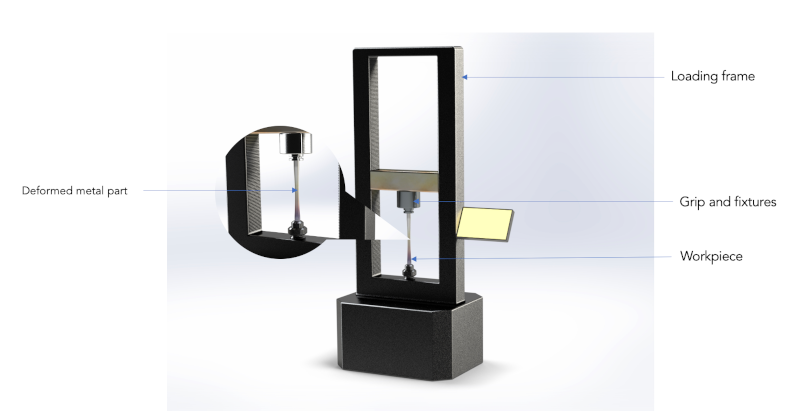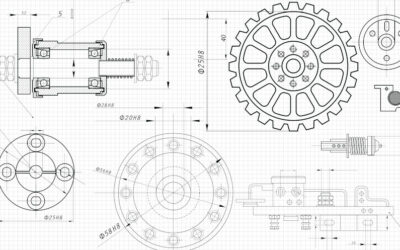Tensile strength is a critical property that engineers and materials specialists must consider when designing and selecting materials for their applications. It refers to the maximum amount of stress a material can withstand before breaking or deforming under tension.
Here, we’ll give you an overview of tensile strength and related concepts. We’ll cover stress and strain, factors that affect it, methods of measuring it, its importance in engineering, and applications.
This will enable you to make informed decisions, optimize designs, and ensure safety and efficiency. It is especially helpful for industries like aerospace, automotive, civil engineering, and energy.
What is Tensile Strength?
Tensile strength can be an important point of interest for many engineers and materials specialists. In simplest terms, tensile strength is the amount of stress that an object can resist before it breaks or becomes deformed when subjected to forces that pull it apart. To understand it, you must first be familiar with related concepts like stress and strain. Stress is the applied force that causes a material to bend or deform, while a strain is the result of that force experienced by the material.
Tensile stress is a type of stress that stretches or elongates the material. Compression, on the other hand, squeezes a material, while shear applies opposed forces along different planes.
When measuring tensile strength, it is important to consider yield strength, ultimate strength, and breaking strength. All three of these measurements track how much force an object can sustain without being permanently damaged. The yield strength represents how much force is needed to cause a permanent change in shape, while ultimate strength indicates total resistance when pushed beyond its elastic limit.
Finally, breaking strength provides a limit for damage, with catastrophic failure occurring once this threshold has passed. Tensile strengths can be measured among different materials and units, including pounds per square inch (psi) or MegaPascals (MPa). These units provide researchers and engineers with insight into potential projects and product design applications based on their knowledge of each project’s context.
Factors Affecting Tensile Strength
Tensile strength is affected by several factors. These include material composition–as the product may be metal or polymeric in nature, ceramic or composite–temperature, strain rate, and any manufacturing processes involved.
Polymers’ tensile strength can be altered to suit the application using reversible or irreversible means such as cross-linking agents and plasticizers. These are important in molding and injection molding polymeric materials.
In metals, altering the heat treatment process can lead to significant changes in their properties like hardness, ductility, and tensile strength. Understanding these factors can help to produce quality materials used not only in engineering but also in commonplace objects with unique properties that are dependent on composition and temperature.
Similarly, other forms of damage, like fatigue and cracking due to service loading, are also related to tensile strength, which need to be taken into consideration if longer-life products have to be designed from these materials. Great attention should also be given to manufacturing defects, such as cold welding between two surfaces that come into contact during assembly operations causing poor interlocking tensile strength at joints on completed products.
Understanding how these factors affect tensile strength alone gives an extensive insight into product optimization through many applications across industries so that it gives maximum value when used in everyday settings or critical services.
How to Measure Tensile Strength

Tensile testing machine illustration
Tensile testing is a crucial process for determining the strength and resilience of materials. To measure tensile strength, preparing the test specimen is essential to ensure accurate and reliable results.
This process requires shaping the material into a standard-sized sample and attaching it to a testing machine in such a way that forces will be applied equally to both ends. The stress-strain curve generated from this testing measures the force necessary to break or deform the specimen.
Non-destructive testing methods can also be used, such as:
- Ultrasonic testing uses high-frequency sound waves that detect flaws, deformations, thickness variations, or other anomalous conditions in tested parts or objects.
- Magnetic particle inspection can detect hidden cracks through magnetizing surfaces that create an electromagnetic field when passing a current through them.
- Eddy current testing can be used to evaluate conductive materials such as conductor bars or cables by measuring changes in electrical resistance when this method is performed on them.
These are beneficial when you need accurate measurements of tensile strength without compromising the integrity of the tested materials.
Importance and Applications of Tensile Strength in Engineering
Tensile strength plays an important role in engineering for both material selection and design considerations. In terms of material selection, its importance is crucial for industries such as aerospace, automotive, civil engineering, and energy.
Knowing its precise value helps you make more informed decisions about the best materials to use in any given application. Additionally, it can inform various design considerations, such as safety factors, material optimization, and stress analysis. You can ensure that your designs meet all safety requirements while making sure the outcome is cost-effective and optimized for efficient performance.
Engineers must take into account a variety of factors when it comes to selecting materials, tensile strength being one of them. After all, it determines how much force a material can handle without breaking or becoming permanently deformed under tension.
By making sure you are aware of the tensile strength required to design a component or an entire machine safely, you can custom-select materials and confidently move forward with funding projects that might have otherwise been deemed too risky due to inadequate data on this variable alone.
Work With Gensun
Gensun is a leading provider of precision manufacturing solutions, including CNC machining services, we offer a diverse range of materials and advanced machining capabilities, ensuring that clients receive components that meet their exact requirements.







